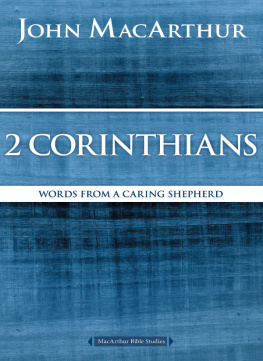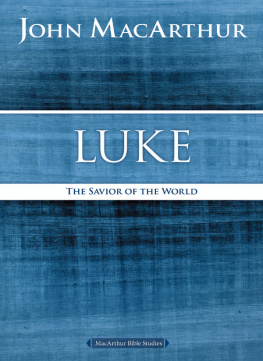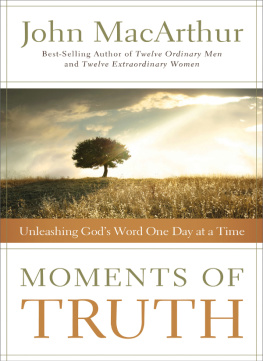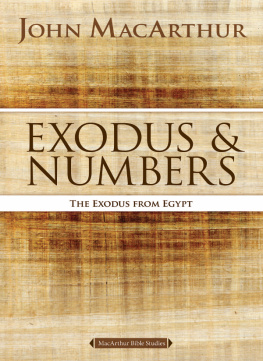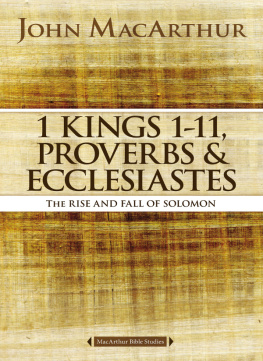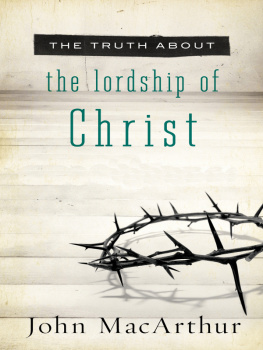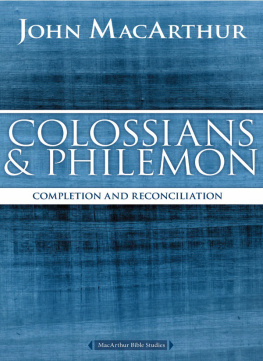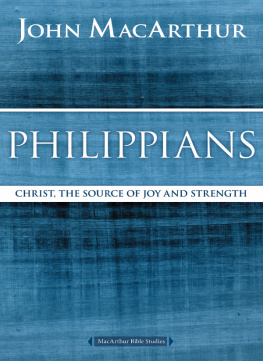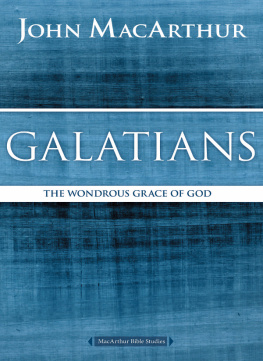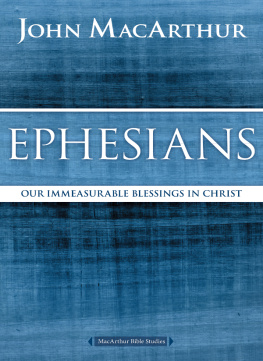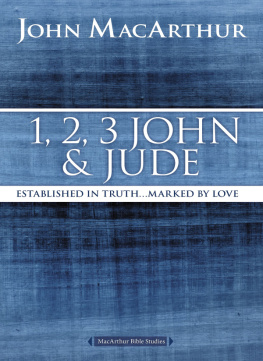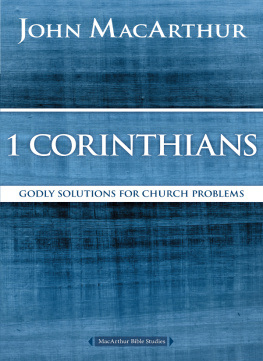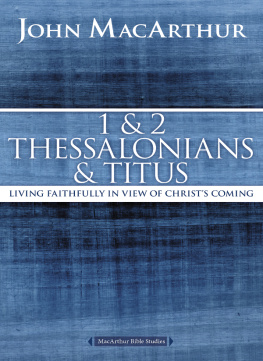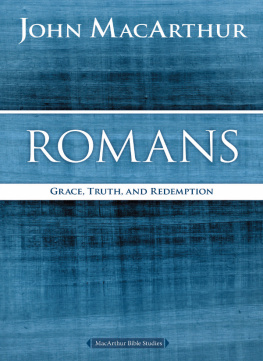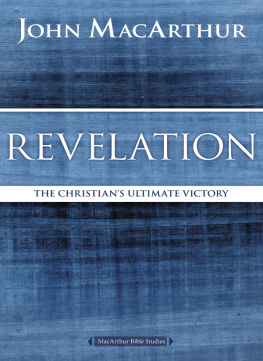2 CORINTHIANS
MACARTHUR BIBLE STUDIES
2007, John MacArthur.
All rights reserved. No portion of this book may be reproduced, stored in a retrieval system, or transmitted in any form or by any meanselectronic, mechanical, photocopy, recording, or any otherexcept for brief quotations in printed reviews, without the prior permission of the publisher.
Published in Nashville, Tennessee, by Nelson Books, an imprint of Thomas Nelson. Nelson Books and Thomas Nelson are registered trademarks of HarperCollins Christian Publishing, Inc.
Nelson Books titles may be purchased in bulk for education, business, fundraising, or sales promotional use. For information, please email SpecialMarkets@ThomasNelson.com
Produced with the assistance of the Livingstone Corporation. Project staff include Jake Barton, Mary Horner Collins, and Andy Culbertson. Project editor: Len Woods
Scripture quotations marked NKJV are taken from The Holy Bible, New King James Version. 1979, 1980, 1982, 1992 by Thomas Nelson, Inc. Publishers. Used by permission. All rights reserved.
Unleashing Gods Truth, One Verse at a Time is a trademark of Grace to You. All rights reserved.
Keys to the Text and Truth for Today material is taken from the following sources:
2 Corinthians. MacArthur New Testament Commentary Series. 2003 by John MacArthur. Published by Moody Publishers, Chicago, Illinois. Used by permission.
Ephesians (electronic ed.). MacArthur New Testament Commentary Series. 1986, 1996 by John MacArthur. Published by Moody Press, Chicago, Illinois. Used by permission.
Galatians (electronic ed.). MacArthur New Testament Commentary Series. 1987, 1996 by John MacArthur. Published by Moody Press, Chicago, Illinois. Used by permission.
The Glory of Heaven. 1996 by John MacArthur. Crossway Books: Wheaton, Illinois. Used by permission.
The MacArthur Study Bible (electronic ed.), John MacArthur, General Editor. 1997 by Word Publishing. All rights reserved. Used by permission.
Philippians. MacArthur New Testament Commentary Series. 2001 by John MacArthur. Published by Moody Press, Chicago, Illinois. Used by permission.
1 and 2 Thessalonians. MacArthur New Testament Commentary Series. 2002 by John MacArthur. Published by Moody Press, Chicago, Illinois. Used by permission.
Truth for Today: A Daily Touch of Gods Grace. 2001 by John MacArthur. Published by J. Countryman Publishers, Nashville, Tennessee.
Cover Art by Holly Sharp Design
Interior Design and Composition by Joel Bartlett, Livingstone Corporation
ISBN: 978-0-7180-3508-2
ISBN: 978-0-7180-3527-3 (eBook)
15 16 17 18 19 RRD 6 5 4 3 2 1
CONTENTS
This is the second New Testament epistle the apostle Paul wrote to the Christians in the city of Corinth.
AUTHOR AND DATE
That the apostle Paul wrote 2 Corinthians is uncontested; the lack of any motive for a forger to write this highly personal, biographical epistle has led even the most critical scholars to affirm Paul as its author.
Several considerations establish a feasible date for the writing of this letter. Extrabiblical sources indicate that July, AD 51 is the most likely date for the beginning of Gallios proconsulship (see Acts 18:12). Pauls trial before him at Corinth (Acts 18:1217) probably took place shortly after Gallio assumed office. Leaving Corinth (probably in AD 52), Paul sailed for Palestine (Acts 18:18), thus concluding his second missionary journey. Returning to Ephesus on his third missionary journey (probably in AD 52), Paul ministered there for about two and a half years (Acts 19:8, 10). The apostle wrote 1 Corinthians from Ephesus toward the close of that period (1 Cor. 16:8), most likely in AD 55. Since Paul planned to stay in Ephesus until the following spring, and 2 Corinthians was written after he left Ephesus, the most likely date for 2 Corinthians is late AD 55 or very early AD 56.
BACKGROUND AND SETTING
Pauls association with the important commercial city of Corinth began on his second missionary journey (Acts 18:118), when he spent eighteen months ministering there. After leaving Corinth, Paul heard of immorality in the Corinthian church and wrote a letter (that has since been lost) to confront that sin, referred to in 1 Corinthians 5:9. During his ministry in Ephesus, he received further reports of trouble in the Corinthian church in the form of divisions among them (1 Cor. 1:11). In addition, the Corinthians wrote Paul a letter (1 Cor. 7:1) asking for clarification of some issues. Paul responded by writing the letter known as 1 Corinthians. Planning to remain at Ephesus a little longer (1 Cor. 16:8, 9), Paul sent Timothy to Corinth (1 Cor. 4:17; 16:1011). Disturbing news reached the apostle (possibly from Timothy) of further difficulties at Corinth, including the arrival of false, self-styled apostles (11:13).
To create the platform to teach their false gospel, they began by assaulting the character of Paul. They had to convince the people to turn from Paul to them if they were to succeed in preaching demon doctrine. Temporarily abandoning the work at Ephesus, Paul went immediately to Corinth. The visit (known as the painful visit, 2:1) was not a successful one from Pauls perspective; someone in the Corinthian church (possibly one of the false apostles) even openly insulted him (2:58, 10; 7:12). Saddened by the Corinthians lack of loyalty to defend him, seeking to spare them further reproof (see 1:23), and perhaps hoping time would bring them to their senses, Paul returned to Ephesus. From Ephesus, Paul wrote what is known as the severe letter (2:4) and sent it with Titus to Corinth (7:516). Leaving Ephesus after the riot sparked by Demetrius (Acts 19:2320:1), Paul went to Troas to meet Titus (2:1213). But Paul was so anxious for news of how the Corinthians had responded to the severe letter that he could not minister there though the Lord had opened the door (2:12; see 7:5). So he left for Macedonia to look for Titus (2:13). To Pauls immense relief and joy, Titus met him with the news that the majority of the Corinthians had repented of their rebellion against Paul (7:7). Wise enough to know that some rebellious attitudes still smoldered under the surface and could erupt again, Paul wrote (possibly from Philippi, see 11:9 with Phil. 4:15; also, some early manuscripts list Philippi as the place of writing) the Corinthians the letter called 2 Corinthians.
In this letter, though the apostle expresses his relief and joy at their repentance (7:816), his main concern is to defend his apostleship (chs. 17), exhort the Corinthians to resume preparations for the collection for the poor at Jerusalem (chs. 8, 9), and confront the false apostles head-on (chs. 1013). He then went to Corinth, as he had written (12:14; 13:12). The Corinthians participation in the Jerusalem offering (Rom. 15:26) implies that Pauls third visit to that church was successful.
HISTORICAL AND THEOLOGICAL THEMES
Second Corinthians complements the historical record of Pauls dealings with the Corinthian church recorded in Acts and 1 Corinthians. It also contains important biographical data on Paul throughout.
Although an intensely personal letter, written by the apostle in the heat of battle against those attacking his credibility, 2 Corinthians contains several important theological themes. It portrays God the Father as a merciful comforter (1:3; 7:6), the Creator (4:6), and the One who raised Jesus from the dead (4:14; see 13:4), and will raise believers as well (1:9). Jesus Christ is the One who suffered (1:5), who fulfilled Gods promises (1:20), who was the proclaimed Lord (4:5), who manifested Gods glory (4:6), and who became poor for believers (8:9; see Phil. 2:58). The letter portrays the Holy Spirit as God (3:17, 18) and the guarantee of believers salvation (1:22; 5:5). Satan is identified as the god of this age (4:4; see 1 John 5:19), a deceiver (11:14), and the leader of human and angelic deceivers (11:15). The end times include both the believers glorification (4:165:8) and his or her judgment (5:10). The glorious truth of Gods sovereignty in salvation is the theme of 5:1421, while 7:910 sets forth mans response to Gods offer of salvationgenuine repentance. Second Corinthians also presents the clearest, most concise summary of the substitutionary atonement of Christ to be found anywhere in Scripture (5:21; see Isa. 53) and defines the mission of the church to proclaim reconciliation (5:1820). Finally, the nature of the new covenant receives its fullest exposition outside the book of Hebrews (3:616).
Next page
